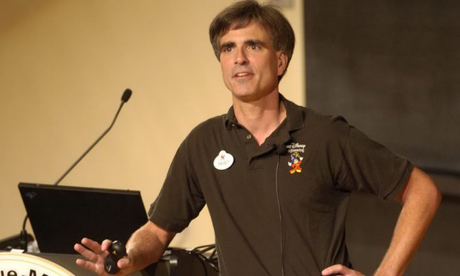
The Last Lecture series at Carnegie Mellon University, Pittsburgh, was designed to let senior academics imagine what message they would impart to history given one final chance. But when Randy Pausch, a professor in both the university's human-computer interaction institute and its school of design, took the podium on September 18 last year, the final chance was almost literally true. Pausch, who has died aged 47, had learned just weeks earlier that his pancreatic cancer has metastasised to his liver and spleen; he had been given a maximum of six months to live.
Pausch delivered his talk to a full hall. But by a remarkable sequence of events, it turned him into a media phenomenon with an internet video scoring millions of hits, network television appearances across America and a book that has topped the bestseller charts since it was published in April, with translations into 29 languages. His mixed message of self-help and a determination to "have fun today, tomorrow and every other day I have left" are widely seen to have resonated with the modern American dream.
Beginning by showing slides of the cancers attacking his pancreas, Pausch told his audience: "If I don't seem as depressed or morose as I should be, sorry to disappoint you," and went on to talk about his goal of living with "childlike wonder". He spoke of childhood dreams he had achieved - among them winning giant stuffed animals at carnivals, designing rides for Walt Disney, walking with zero gravity, and writing an entry in the World Book encyclopedia he had adored as a boy. He mentioned dreams he had not achieved - such as being Star Trek's Captain Kirk, or playing football in the US national football league - but pointed out he had learned valuable lessons from both the TV show and from playing high school football.
He said he believed that if you lived life the right way, and realised "the brick walls are to separate those who really want to do something from those who say they do" that "the dreams will come to you". He added that the following day was his wife's birthday, and as his audience sang Happy Birthday a giant cake was wheeled out.
Pausch's talk might never have gone beyond campus memory had it not been for the intervention of Jeffrey Zaslow, a Wall Street Journal columnist and Carnegie Mellon graduate, who had heard about the circumstances of the event and driven from Chicago to attend. His resulting column, and link to a video of the lecture on the journal's website, produced an amazing example of electronic instant celebrity. The video gained an enormous response, and last September ABC Television invited Pausch on to their Good Morning America programme and made him their "news person of the week". In October he repeated his lecture on the Oprah Winfrey show. He also agreed to collaborate with Zaslow on a book, dictating his copy over the telephone while he rode his bicycle, one hour a day for 53 days. A bidding war pushed the advance for The Last Lecture to $6.7m.
Though it may lose something in translation, Pausch's faith in earnest sincerity has inspired many in more cynical societies. But it falls into a very American tradition of self-help, ranging from Norman Vincent Peale's Power of Positive Thinking to Disney's faith in childhood. It was also perfect for American media to exploit in their effort to infantilise their audience; a Diane Sawyer-hosted special on Pausch was subtitled A Love Story for Your Life. Explicitly non-religious (Pausch joked that his only conversion was to Mac computers), it also touched the desire for public uplift currently being echoed in the style of Barack Obama's presidential campaign.
Pausch was born in Baltimore, where his father sold insurance and his mother was a teacher. His parents founded a group called Up With Kids to teach immigrant children English, and indulged young Randy's imagination, letting him paint on the walls of his bedroom. After graduating in computer science from Brown University in Providence, Rhode Island, in 1982, he was accepted on his second try at Carnegie Mellon, where he earned his doctorate in computer science in 1988. He then taught at the University of Virginia until 1997, when he returned to Carnegie Mellon as an associate professor.
His course, Building Virtual Worlds, was extremely popular, and included an annual "virtual reality" contest. He devised a program to mimic the effects of weightlessness, and co-created a program called Alice, which used games to teach young people, particularly girls, computer programming. During sabbaticals, he worked with Disney Imagineering to create an Aladdin ride for Disney World, and was a consultant to Electronic Arts, maker of video games.
The publicity generated by his lecture won Pausch an invitation to appear in the next Star Trek movie, and last October he got to practice for a day with the Pittsburgh Steelers football team. He also used his new-found fame to testify before the US Congress on behalf of pancreatic cancer research, and filmed a fundraising charity commercial.
But he stopped having chemotherapy in June, and moved to Chesapeake, Virginia, to be near his wife's family. He is survived by his wife Jai and their young children, Dylan, Logan, and Chloe, for whom he maintained his lecture was intended as a message-in-a-bottle. Pausch said his mantra was that "we cannot change the cards we are dealt, just how we play the hand."
· Randolph Frederick Pausch, computer scientist, born October 23 1960; died July 25 2008
· This article was amended on Friday August 1 2008. Norman Vincent Peale, rather than Dale Carnegie, wrote The Power of Positive Thinking. Dale Carnegie wrote, among other books, How to Win Friends and Influence People. This has been corrected.

